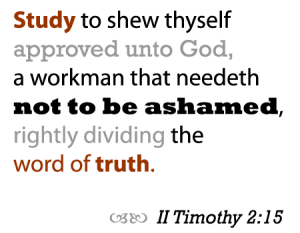The question asked:
“The one time in the Bible that Jesus was angry is with the money changers selling goods in the temple. My queston is what is the difference in preachers selling CDs and such in the foyer of the church. Please reply”
Dear Friend:
Thank you for your question. There is no doubt that, like you, many others have wondered about this practice.
My personal feeling is that some of this may indeed overstep the bounds of propriety and the liberty under grace has been at times abused. However much we agree or disagree with the practice, the rule must always be “What saith the scripture?”
I do not read in the Bible that Jesus was “angry” in the Temple although it is evident He was highly displeased. The one time in the Bible where Jesus is said to have been angry is:
“1 And he entered again into the synagogue; and there was a man there which had a withered hand.
2 And they watched him, whether he would heal him on the sabbath day; that they might accuse him.
3 And he saith unto the man which had the withered hand, Stand forth.
4 And he saith unto them, Is it lawful to do good on the sabbath days, or to do evil? to save life, or to kill? But they held their peace.
5 And when he had looked round about on them with anger, being grieved for the hardness of their hearts, he saith unto the man, Stretch forth thine hand. And he stretched it out: and his hand was restored whole as the other. (Mark 3:1-5 KJB)
The only reason I mention this is because every WORD of the Bible is pure and must be carefully read. The subject of Jesus’ anger in the Bible is another study altogether and those verses above are important to it. And, it is very important to note Jesus’ reactions to things and various people. Those He is angry with above are RELIGIOUS LEADERS who deliberately rejected the word of God and had hardened their hearts toward God. The Temple people were ordinary people “trying to make a dime”. You might say, “Well how can a person drive out people from the Temple with a scourge and overthrow tables without being angry?” Jesus could. Good parents correct and even switch their children without anger but in love.
The Temple account says:
“13 And the Jews’ passover was at hand, and Jesus went up to Jerusalem,
14 And found in the temple those that sold oxen and sheep and doves, and the changers of money sitting:
15 And when he had made a scourge of small cords, he drove them all out of the temple, and the sheep, and the oxen; and poured out the changers’ money, and overthrew the tables;
16 And said unto them that sold doves, Take these things hence; make not my Father’s house an house of merchandise.” (John 2:13-16 KJB)
(notice that it was POSSIBLE that Jesus used the scourge “of small cords” to primarily drive the animals out–how else could oxen be driven? And, He was kinder to “them that sold doves” since they were helping the poor people with their sacrifice. Mark 11:17 below says “And He taught” indicating that He saw the ability of these common men to learn by the rebuke of their practice. He did not try to teach those RELIGIOUS LEADERS who had already rejected God. I say “possible”–NOT “probably”)
“15 And they come to Jerusalem: and Jesus went into the temple, and began to cast out them that sold and bought in the temple, and overthrew the tables of the moneychangers, and the seats of them that sold doves; 16 And would not suffer that any man should carry any vessel through the temple.
17 And he taught, saying unto them, Is it not written, My house shall be called of all nations the house of prayer? but ye have made it a den of thieves.” (Mark 11:15-17 KJB)
“45 And he went into the temple, and began to cast out them that sold therein, and them that bought;
46 Saying unto them, It is written, My house is the house of prayer: but ye have made it a den of thieves.
47 And he taught daily in the temple. But the chief priests and the scribes and the chief of the people sought to destroy him,
48 And could not find what they might do: for all the people were very attentive to hear him.” (Luke 19:45-48 KJB)
Reading the text carefully and comparing His actions toward common people in the Temple passages, might even change our opinions of the artists who typically make the Lord look very angry, picturing almost a battle in the Temple! Art pictures sometime add things that are not in the Bible and do not correctly interpret scenes. One glaring example is the long haired, feminine Christ that is usually portrayed in art.
In order to adequately cover the question, I think we need to get some background. The Temple was in the city of Jerusalem and the needed sacrifices were not available to the worshippers coming from not only the city but also others from various towns and parts of Judea.
The Passover is the greatest of all holy feasts for the Jew. It began the Jewish years in which there were all kinds of holy feasts, sabbaths and holy days. In Exodus 12:11 the scripture said it was “the LORD’S passover.” We can see that many centuries after, the Bible calls this feast “the passover of the Jews”: that description is significant. First given, the Passover belonged to the “LORD.” After centuries of apostasy it is the “Jews'” passover and all kinds of practice was inserted after the traditions of man. The practice developed to meet the needs of these people who did not have a “farm” or those who traveled long distances to get to the Jerusalem Temple and could not bring animals such distances. The “money changers” were there to convert the different currencies needed to purchase the sacrifices. All of this combined to make the business of selling the animals a very profitable business. No doubt the money changers were also thriving—by charging a fee to exchange the money.
There were no provisions under the Law to allow these practices in the Temple, even if they were honest. Had the buying and selling been conducted outside the Temple, Jesus would not have bothered them. But the Temple was “holy” and these practices were not sanctioned under the Law. In addition, these men were thieves (Mark 11:15-17). Therefore, Jesus drove them out. It is significant that, even though the Temple worship had been corrupted, along with the feast days, Jesus did not allow that to stop the proper worship of the LORD, under the Law of Moses. It was not apostasy as such that set aside the Law, it was the death of Christ on the cross and His fulfillment of the Law that instituted this present Age of Grace. Our “passover” in this Age of Grace has already been accomplished: Christ alone. (1 Corinthians 5:7)
Are we to demand the church building and practice in its use in this Age of Grace be what the Temple was under the Law? Everything depends on whether or not the church building is as much the “holy place” as the Temple was under the Law of Moses (Jesus earthly ministry was under the Law) and whether we are still under the Law of Moses or now under Grace.
Under the Law the Tabernacle and the Temple were “holy places” with “holy things” and “holy activities” even though they were “made with hands” of men. God gave specific instruction regarding all the activities and articles and who could be in certain areas. The articles and instruments were all for the worship of God. In fact, the very center was “the holy of holies” and only the high priest could enter it but once a year on the Day of Atonement–and when he entered, he had to bring blood and sprinkle it on the Mercy Seat.
By the work of Christ on the cross we are no longer under the Law; we are “dead to the law” (Romans7) and no longer under bondage to sacrifices, holy furniture, holy days, or holy buildings. These things were all shadows and types of the True. We are to no longer live in the shadows but in the Light. (Hebrews 8:5; Colossians 2:17) The “temple of the Holy Ghost” is the body of the believer–the “temple” is no longer a building..
“19 What? know ye not that your body is the temple of the Holy Ghost which is in you, which ye have of God, and ye are not your own?
20 For ye are bought with a price: therefore glorify God in your body, and in your spirit, which are God’s.” (1 Corinthians 6:19-20)
In other words, every day and every activity in every place is to be treated by the believer in Christ as the same. “Whether therefore ye eat, or drink, or whatsoever ye do, do all to the glory of God.” (1 Corinthians 10:31). Sunday is no different from Tuesday and 11AM is not holier than 7PM. There are no holy days under grace. “Let no man therefore judge you in meat, or in drink, or in respect of an holyday, or of the new moon, or of the sabbath days:” (Colossians 2:16)
In this present Age of Grace there are no holy places made by the hands of men and God is not worshipped by priests entering in a “holy place” to make sacrifices and offerings.
“24 God that made the world and all things therein, seeing that he is Lord of heaven and earth, dwelleth not in temples made with hands;
25 Neither is worshipped with men’s hands, as though he needed any thing, seeing he giveth to all life, and breath, and all things; (Acts 17:24-25).”
A “church building” is nowhere commanded to be built or used to worship God in this present Age of Grace. The early churches (groups of saved people) were small groups and met in their houses. (Philemon 3). A church building is a matter of convenience for large groups of people to meet–it is sensible to not want 200 people in your house.
As a matter of personal preference I might sell my CD’s at some other place than the church foyer but the word of God will not allow me to put my brother under the Law and demand that he not do it because the foyer is a “holy place” just like the Temple was in Jerusalem. In that case, we would have to insist on observance of the Feast of Passover, Pentecost, Day of Atonement, Sabbath observance of the seventh day (Saturday), circumcise all the males, never plant tomatoes with beans in the garden, and refuse to eat barbecued pork, fried catfish, etc.
To lay attention on the building because it is a “holy place” is wrong. To treat the place where you meet (even a “brush arbor” or a rented hall or a million dollar complex) as a group to worship God as you would a ball park or Walmart is also wrong. These things should be decided by the “big picture” on Law and Grace in the Bible and common sense in practice.
Is it “wrong” to sell things in the meeting house? It might not be the most practical and it might not be the best choice, but to condemn the practice as unscriptural, the answer is, “No.”
–DR


